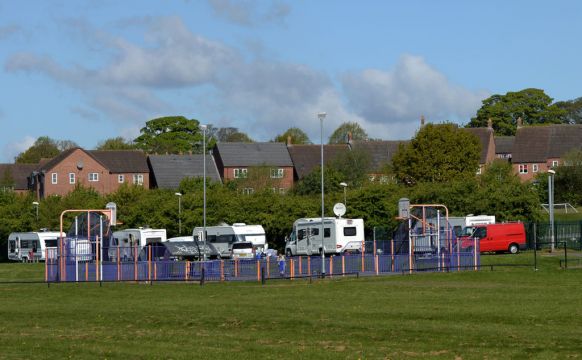A Supreme Court judge has said the Irish Traveller community remains a “vulnerable minority” at the margins of society, as the court overturned a decision to order Travellers to leave public land.
Mr Justice Gerard Hogan said members of the Traveller community have struggled for recognition of their own cultural identity and way of life.
It comes as the Supreme Court overturned an injunction from the High Court requiring husband and wife Bernard and Helen McDonagh, their sons and extended family to vacate council-owned land in Co Clare.
The family have been living at Cahercallamore, Ennis for several years.
FLAC welcomes landmark Supreme Court decision concerning the summary eviction of Travellers and seeks urgent legislative reformhttps://t.co/4vXtxzDvvy@itmtrav @PaveePoint @CommunityFound @_IHREC @ExchangeHouseIr @involve_youth @NTMABS @NTWFIRL
Advertisement— FLAC (@flacireland) January 31, 2022
In delivering the judgment, Mr Justice Hogan said that the legal system has “not found it altogether easy” to accommodate the distinct cultural traditions of the travelling community within its traditional ambit of protecting and enforcing property rights.
Mr Justice Hogan considered the constitutional protection afforded to the home and also under Article 8 of the European Convention on Human Rights.
While he accepted that the Traveller families concerned were trespassers on the land and also that the placing of their caravans was in breach of planning laws, he did not consider that this justified a court granting an injunction.
The decision was welcomed by Free Legal Advice Centres (Flac).
Sinead Lucey, managing solicitor with Flac, said the decision clarifies that the protection of the dwelling under the Constitution extends to Travellers living on unauthorised sites.
“Through its Traveller Legal Service, Flac has been raising concerns about the fairness of the summary eviction of homeless Traveller families over several years, including through its case work.
“This decision clarifies that the courts must also have regard, where appropriate, to the case law of the European Court of Human Rights.
“The recognition of Travellers as a vulnerable minority by the court is also hugely significant as it places a particular duty on the courts to take into account their circumstances when faced with an application to have them effectively evicted from an unauthorised site.
“This judgment finally grapples with some of this difficulty and seeks to provide some balance, such that the particular disadvantage experienced by many Travellers, particularly arising from the reluctance of local authorities to deliver Traveller specific accommodation, is at least acknowledged and weighed in the balance by the legal system, including the Courts.”
Christopher McCann, solicitor with the Traveller Legal Service, said: “This is a very significant judgment that should see Travellers granted the procedural protections consistent with their rights under the Constitution and the European Convention on Human Rights.
“All too often Travellers are evicted from sites by local authorities whose responsibility it is to house them, without any alternative accommodation being offered, and without any assessment by a court of the impact of the eviction on the Travellers’ rights.
“In our view, this should prompt the Government to reconsider the other legislative mechanisms used to evict Travellers which have no requirement for the proportionality of an eviction order to be considered by a Court and which barely contain any procedural safeguards at all.”







